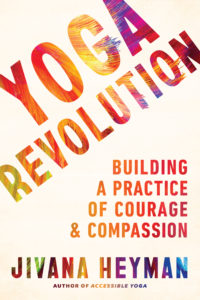
by Nina
I’m excited to announce that Jivana Heyman, who used to write for our blog a few years ago, has a new book coming out this month—on December 7! In advance of its publication, I decided to interview Jivana about the new book (which I was able to read a few months ago) so you all could learn more about why he wrote this important new book and what it is all about.
Nina: For those who aren’t already familiar with you and your work, can you tell us a little about yourself and your yoga background?
Jivana: My yoga journey actually started when I was a young child and my grandmother taught me yoga. She was a student of Swami Satchidananda and J. Krishnamurthi, and she studied with them starting in the 60s in the LA area. I returned to yoga in my early twenties. I was an AIDS activist, and I was struggling with grief and stress during the height of the AIDS epidemic.
Yoga was very healing for me, and I decided to become a yoga teacher so that I could share it with my community. I started teaching yoga for people with HIV and AIDS in 1995 in San Francisco. Around 1998, I started training yoga teachers in how to make their classes accessible. This eventually morphed into the Accessible Yoga Training, which I’m still offering today. In 2007, I started training my students with disabilities to become yoga teachers, and started using the term “accessible yoga.” In 2015, we held our first Accessible Yoga Conference, and the nonprofit, Accessible Yoga Association, grew out of that.
One thing I like to clarify is that I am mostly interested in giving people access to the heart of the teachings, not simply making asana accessible. Sometimes I think people have a misconception about Accessible Yoga and think it is about simplifying or even dumbing down yoga. On the contrary, I think it’s about making the teachings available, clear, and understandable.
Nina: Your new book, Yoga Revolution: Building a Practice of Courage and Compassion, is a big departure for you. Your first book, Accessible Yoga, was about the yoga teaching you’ve been doing for a number of years: making yoga accessible to those who are often overlooked or excluded from mainstream classes. In your new book, you’re challenging all of us to change the way we think about and practice yoga. Normally yoga books focus on cultivating equanimity or wellness. But in this new book, you show us how to use yoga to fuel our compassion for others and to support us while we engage in acts of service and social activism in order to create a world that reflects yoga’s message of unity, equity, and justice. What motivated you to spread this message?
Jivana: That’s an interesting question. I still say that yoga is about finding equanimity, but my point is that we shouldn’t stop there. We need to look at what we do once we’ve found peace, and once we’ve gotten more energy. Then what?
The way I’ve structured my book is to explain that first we need to allow yoga to cultivate an inner revolution in terms of the way we relate to ourselves. In the subtitle I refer to this as courage—the strength it takes to look at ourselves honestly and with kindness. It takes courage to be reflective and to heal the relationship between our heart and mind.
Then in the second part of the book, I focus on an outer revolution, which is what I think you’re asking about. This is where we allow the inner practice of yoga to influence our actions in the world. In yoga, there is a long tradition of karma yoga, seva or service, and you can see it clearly in the teachings of the Bhagavad Gita. Since most contemporary practitioners aren’t monks, I think this is particularly important for us to consider. As engaged members of society, we need to look at how our inner practice influences our outer actions in the world.
Nina: Can you say more about yoga’s message about unity, equity, and justice?
Jivana: Yoga begins with the idea that we all share a basic spiritual essence, purusha or atman. That essence is the same within you and within me, and within all beings. In other words, yoga begins with equality. At the same time, the teachings acknowledge that my body and mind is completely different than yours. There is a tension there—between equality and difference—that seems paradoxical. Of course, I find truth can usually be found in the paradox!
This tension is between the idea that we are the same and yet different. We share the same spirit, yet our lived experience is completely individual. Our personal lived experience is influenced by social factors such as our gender, race, age, disability, body size, sexuality, economic and social class, etc.
The challenge of our yoga practice is to experience the connection we have with all other beings (to find compassion) and yet acknowledge our differences. If we don’t acknowledge our differences and the suffering of others, we tend to engage in spiritual bypassing.
Nina: And can you explain what service and social justice are and how they are essential aspects of yoga?
Jivana: As I mentioned, service is a traditional path of yoga. In the Bhagavad Gita, Krishna teaches Arjuna how to act without attachment to the result of his actions. In this way, we learn to shift the mind’s focus away from its tendency to seek pleasure in the external world. This is yoga in action. We are acknowledging the fact that peace is found within us, rather than outside.
The peace that is found within us can also be understood as love—universal, non-transactional love. I remember the feeling I had when my kids were infants. There was a love present that went beyond our personal relationship. I cared for them without a thought to my own benefit, waking up at all hours to feed or change them, giving up so much of my time and energy to them. That felt like the purest form of service I’ve ever experienced.
To me, social justice is service, wanting everyone to enjoy the same basic human rights. More than that, when I care for others I’ll speak out on their behalf. My AIDS activism was love in action, even though it may not have looked like that from the outside. My activism was a way to express the love and care I felt for my community.
I think we each have our own path of service in life, and that may not always look like social justice. But I think it always has a quality of compassion, care, and deep love. To be honest, I think my book asks more questions than it answers. I want people to explore what service looks like for them and how they can cultivate an engaged yoga practice.
Nina: An important concept in the book is what you call the “rainbow mind.” Can you tell us a bit about what the rainbow mind is and what its value is to the yoga practitioner?
Jivana: In the book, I share my journey with anxiety, and how I’ve struggled with working with my mind. I reflect on the narrative of controlling the mind that we’re generally taught in yoga. I noticed that by embracing my mind’s endless creativity rather than trying to stop it, I had more success in finding calm and peace.
To me, rainbow mind, is the feeling of complete openness and acceptance. Instead of making my mind quiet, what if I allow it to be as loud as it wants and embrace all of it? An example of this is when I look out on a landscape, and rather than focusing on one thing, I allow all of it to enter my field of vision. Rather than pushing away unwanted thoughts with an unconscious, “No!” what if we accepted all the thoughts with a conscious, “Yes?”
I also thought about what enlightenment means to me in the context of my householder path. Personally, I’m not searching for a way to leave the world through samadhi. Rather, I’m trying to find a way to become more connected, more present, more loving. Rainbow mind is my vision for what it’s like to embrace the chaos, the uncertainty, and the raw beauty of life. It’s also a nod to my queerness and the idea that difference and diversity is to be celebrated and embraced.
Nina: In the end, you do circle back around to equanimity and true happiness. Can you say something about how “building a practice of courage and compassion” eventually leads you to the true happiness that yoga promises?
Jivana: Yoga challenges me to have the courage to turn within and connect with the fullness within myself. It can take courage to be with my mind—my endless, racing thoughts and all my emotions. But, once I’ve connected to the fullness within myself, my interactions in the world change. I’m no longer looking for fulfillment because I’m already full.
Stepping into the world in fullness feels very different than stepping into the world empty. I don’t constantly look to others to help me or fix me. I can engage in the world in a generous way, with compassion and in service. Personally, my happiest moments are when I am of service to others. When I can support, care for, or just listen to another. This is how yoga offers us happiness, not just by finding peace within but by sharing it with others.
Nina: Is there anything else you’d like to say to our readers?
Jivana: I want to say that I’m not trying to revolutionize yoga. Yoga is fine. What I’m saying is that yoga is revolutionary. It offers a radical departure from the western capitalist culture many of us have been raised in. I hope that people are open to exploring the ways that the yoga teachings allow us to shift our perspective, and I mean this literally. Yoga uses a series of incredibly effective practices—asana, pranayama, meditation—to shake us up. Once you’re shaken up, you can examine all the parts and put them back together in a more conscious way. Yoga offers practices to build our lives consciously and with love.
Most of all, I would love to know what people think of the ideas I share in the book. I hope that it sparks reflection and further questions. And thank you, Nina, for these great questions!
Nina: When will your book be released and where is it available for pre-order?
Jivana: The book is being released on Tuesday, December 7th. I’m having a free book launch event that day at 5:00pm PT/8:00pm ET, and everyone is welcome. You can also access a few free classes and a meditation on my website if you order the book. Here’s a list of different places to order it: https://www.accessibleyogatraining.com/yoga-revolution
Follow Yoga for Healthy Aging on Facebook ° To order Yoga for Healthy Aging: A Guide to Lifelong Well-Being, go to Amazon, Shambhala, Indie Bound or your local bookstore.


Leave A Comment